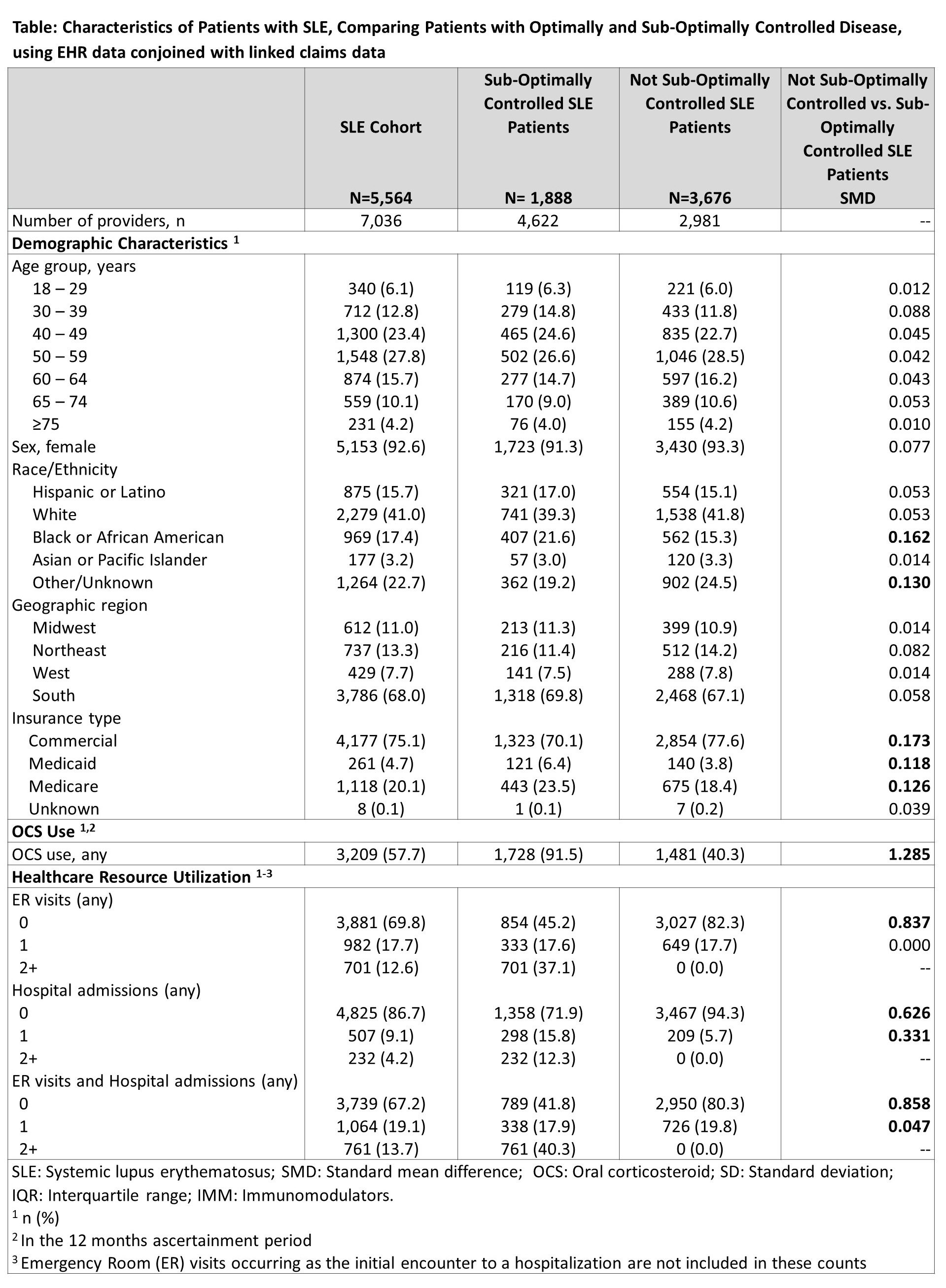Session Information
Session Type: Poster Session C
Session Time: 10:30AM-12:30PM
Background/Purpose: Despite new developments in systemic lupus erythematosus (SLE) treatment and treatment guidelines, the clinical management of SLE is often sub-optimal. We aimed to describe the characteristics of SLE patients with suboptimal disease control in a large practice-based research rheumatology network using electronic health records (EHR) and linked claims data to identify those who could potentially benefit from treatment optimization.
Methods: We queried the data warehouse of Illumination Health, which includes data from the Excellence Network in Rheumatology (ENRGY) practice-based research network, from 1/2016-4/2024 including patients ≥18 years old, with ≥2 ICD10 codes beginning with M32.* (excluding M32.0) within 30-365 days, with ≥12 months of EHR data, and active in the rheumatology network in the 6 months prior to 4/30/2024. EHR data were linked with claims data from Komodo Health (Commercial, Medicare and Medicaid data from 1/2016 to 2/2024), requiring ≥12 months of continuous coverage in claims data for inclusion in this study. We defined suboptimal control as: (i) mean daily oral corticosteroid (OCS) treatment (measured in prednisone equivalent) of >5 mg according to EULAR guidelines for ≥8 weeks, or (ii) ≥2 hospitalizations and/or ≥2 emergency room (ER) visits in the most recent 12 months covered by claims data.
Results: We identified 5,564 eligible patients with SLE (Table). Patients were mostly female (92.6%), White (41.0%), 40-59 years old (50-59 years: 27.8%; 40-49 years: 23.4%), commercially insured (75.1%), and resided in the southern states of the U.S. (68.0%). Approximately 34.0% (1,888/5,564) of patients had sub-optimally controlled SLE, with 59.7% qualifying through OCS dose >5mg only, 22.5% through ≥2 hospitalizations or ≥2 ER visits only, and 17.9% through OCS dose and ER/hospitalizations. There was a greater proportion of Black or African American and Hispanic patients with SLE in the sub-optimally controlled versus not sub-optimally controlled cohort (21.6% vs. 15.3% and 17.0% vs. 15.1%, respectively). Similarly, a larger proportion of patients had Medicaid and Medicare coverage in the sub-optimally controlled cohort (6.4% vs. 3.8% and 23.5% vs. 18.4%, respectively).
Conclusion: Although there are recommendations to minimize the use of OCS in SLE management, utilization of high-dose OCS remains high, underscoring the importance of treatment optimization to improve disease control especially in African American and Hispanic populations.
To cite this abstract in AMA style:
Curtis J, Holladay E, Mudano A, Smitherman E, xie F, Daigle S, Su Y, Binka M, Atefi G, Muhammad Qasim Khan R, Olufade T. Adherence to EULAR Recommendations and Sub Optimal Management of Systemic Lupus Erythematosus in a Network of Community-Based Rheumatology Practices in the United States [abstract]. Arthritis Rheumatol. 2024; 76 (suppl 9). https://acrabstracts.org/abstract/adherence-to-eular-recommendations-and-sub-optimal-management-of-systemic-lupus-erythematosus-in-a-network-of-community-based-rheumatology-practices-in-the-united-states/. Accessed .« Back to ACR Convergence 2024
ACR Meeting Abstracts - https://acrabstracts.org/abstract/adherence-to-eular-recommendations-and-sub-optimal-management-of-systemic-lupus-erythematosus-in-a-network-of-community-based-rheumatology-practices-in-the-united-states/

